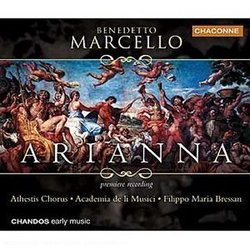| All Artists: Benedetto Marcello, Filippo Maria Bressan, Academia de li Musici, Antonio Abete, Gloria Banditelli, Sergio Foresti, Mirko Guadagnini, Anna Chierichetti, Athestis Chorus Title: Marcello: Arianna Members Wishing: 0 Total Copies: 0 Label: Chandos Release Date: 7/25/2000 Album Type: Box set Genres: Pop, Classical Styles: Vocal Pop, Opera & Classical Vocal, Forms & Genres, Theatrical, Incidental & Program Music, Historical Periods, Baroque (c.1600-1750) Number of Discs: 3 SwapaCD Credits: 3 UPC: 095115065624 |
Search - Benedetto Marcello, Filippo Maria Bressan, Academia de li Musici :: Marcello: Arianna
 | Benedetto Marcello, Filippo Maria Bressan, Academia de li Musici Marcello: Arianna Genres: Pop, Classical
In his satirical introduction to The Beggars' Opera of 1728, John Gay claims that he "introduced the similes that are in your celebrated operas: the Swallow, the Moth, the Bee, the Ship, the Flower...and I have observed su... more » |
Larger Image |

 Track Listings (19) - Disc #1
Track Listings (19) - Disc #1